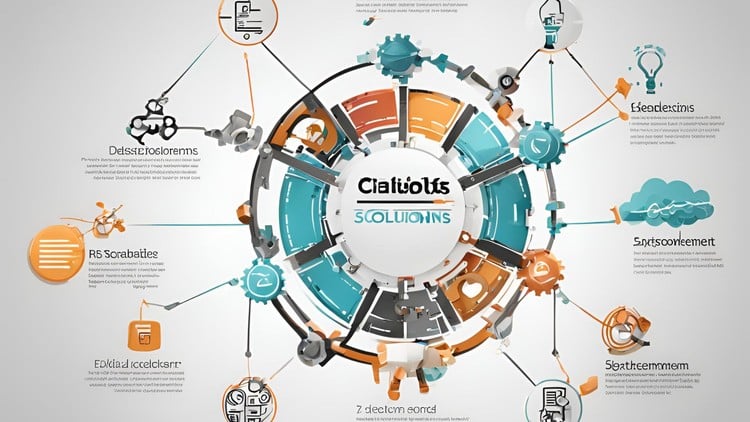
JNJ / SAP Best Practices for Associate and Professional Solution Architect. Content better than aws certified courses
⏱️ Length: 6.3 total hours
⭐ 4.38/5 rating
👥 30,682 students
🔄 January 2025 update
Add-On Information:
Note➛ Make sure your 𝐔𝐝𝐞𝐦𝐲 cart has only this course you're going to enroll it now, Remove all other courses from the 𝐔𝐝𝐞𝐦𝐲 cart before Enrolling!
- Course Overview
- This Masterclass transcends the conventional approach to solution architecture, equipping participants with the strategic acumen and practical methodologies to architect and implement truly end-to-end solutions.
- Moving beyond siloed component knowledge, this program emphasizes a holistic perspective, fostering the creation of robust, scalable, and value-driven solutions that address complex business challenges from conception to realization.
- Leveraging industry-leading frameworks, the course provides a sophisticated understanding of the principles underpinning exceptional solution design, ensuring participants can navigate the intricacies of modern technological landscapes.
- The curriculum is meticulously crafted to build upon foundational architectural concepts, progressively introducing advanced techniques and real-world applications that differentiate merely functional solutions from those that epitomize excellence.
- Participants will gain unparalleled insight into the strategic decision-making processes that drive successful enterprise-level solution development, mirroring the best practices employed by leading organizations like JNJ and SAP.
- The program is designed to be highly actionable, with a clear trajectory from theoretical understanding to hands-on application and the development of demonstrable solution design capabilities.
- With a recent January 2025 update, the content reflects the latest advancements and emerging trends in solution design and development, ensuring its relevance and cutting-edge applicability.
- The course content is positioned as exceeding the depth and breadth of widely recognized certification programs, offering a more comprehensive and practical learning experience for aspiring and established Solution Architects.
- A significant emphasis is placed on the “why” behind design choices, enabling participants to articulate the strategic rationale and business impact of their proposed solutions.
- The learning journey is structured to build confidence and capability in tackling diverse and challenging solution design scenarios.
- Requirements / Prerequisites
- A foundational understanding of IT infrastructure, software development lifecycle, and general business processes is beneficial.
- Familiarity with enterprise architecture principles or roles is advantageous but not strictly required.
- A willingness to engage with complex problem-solving scenarios and adopt a strategic mindset is essential.
- Participants should possess a keen interest in understanding the complete journey of a solution from business need to deployment and ongoing optimization.
- Basic analytical skills and the ability to comprehend technical and business requirements are expected.
- While not mandatory, prior exposure to project management or business analysis concepts can enhance the learning experience.
- Skills Covered / Tools Used
- Strategic Solution Visioning: Developing the ability to conceptualize and articulate comprehensive solution strategies that align with overarching business objectives.
- Cross-Functional Collaboration Enablement: Learning to foster effective communication and integration between diverse technical teams, business stakeholders, and operational units.
- Risk Identification and Mitigation Strategies: Mastering techniques to proactively identify potential risks throughout the solution lifecycle and develop robust mitigation plans.
- Scalability and Performance Architecture: Designing solutions that can seamlessly grow with the business and maintain optimal performance under varying loads.
- Integration Pattern Mastery: Understanding and applying various integration methodologies to ensure seamless data flow and interoperability between disparate systems.
- Cost-Benefit Analysis for Solutions: Developing the capability to evaluate the financial implications and potential ROI of proposed solution designs.
- Agile and Waterfall Methodology Adaptation: Learning to apply appropriate development methodologies based on project context and business needs.
- Data Architecture and Governance Principles: Establishing principles for effective data management, security, and accessibility within the designed solution.
- Security by Design: Integrating security considerations into every phase of the solution design to ensure robust protection of assets and data.
- Technology Stack Evaluation and Selection: Developing expertise in assessing and choosing appropriate technologies to meet specific solution requirements.
- Change Management Integration: Understanding how to plan for and facilitate the successful adoption of new solutions within an organization.
- Benefits / Outcomes
- Participants will emerge with the capability to design and oversee the development of complete, integrated solutions that deliver tangible business value.
- Graduates will be proficient in bridging the gap between high-level business strategy and detailed technical implementation, ensuring alignment and execution.
- The course fosters the development of thought leaders in solution architecture, capable of driving innovation and transformation within organizations.
- Participants will gain a distinct competitive advantage in the job market, recognized for their comprehensive understanding of end-to-end solution design.
- The ability to architect resilient, scalable, and future-proof solutions that can adapt to evolving business needs will be a core competency.
- Improved communication and influence with both technical teams and executive leadership regarding solution proposals and strategies.
- A heightened understanding of how to optimize existing systems and design new ones for maximum efficiency and effectiveness.
- The confidence to take ownership of complex solution development projects from inception to successful deployment.
- An expanded professional network through engagement with instructors and fellow participants, fostering collaborative learning.
- PROS
- Industry-Leading Frameworks: Emphasis on proven methodologies like Six Sigma, Lean, and Design Thinking, providing a strong theoretical and practical foundation.
- Real-World Application: Inclusion of live case reviews offers invaluable insights into practical challenges and successful strategies encountered in professional settings.
- Comprehensive Scope: Covers the entire solution lifecycle, ensuring a holistic understanding rather than a piecemeal approach.
- High-Quality Content: Positioned as exceeding established certification standards, suggesting a depth of knowledge and practical relevance.
- Large Student Base & High Rating: Demonstrates proven success and positive learner experiences.
- Recent Update: Content is current, reflecting the latest trends and best practices in solution design and development.
- CONS
- Potential for High Cognitive Load: The comprehensive nature and advanced methodologies might require significant dedication and a strong foundational understanding to fully absorb.
Learning Tracks: English,Design,Design Tools
Found It Free? Share It Fast!